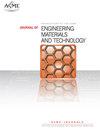添加17-4PH不锈钢应变速率相关力学性能的XFEM分析
IF 1.9
4区 材料科学
Q3 ENGINEERING, MECHANICAL
Journal of Engineering Materials and Technology-transactions of The Asme
Pub Date : 2023-01-23
DOI:10.1115/1.4056729
引用次数: 0
摘要
采用扩展有限元法(XFEM)分析了与三点弯曲试验、紧凑拉伸试验和单边裂纹相对应的17-4PH不锈钢增材(AM)试样。基于实验结果,使用“Abaqus 6.14”软件进行了二维和三维弹塑性模拟,并与模拟结果进行了验证。在XFEM中,使用单位划分(PU)对标准有限元网格中的裂纹进行建模。基于模拟结果,本研究将AM 17-4PH不锈钢样品与锻造17-4PH样品的力学性能进行了比较。采用应力强度因子和J积分测量了试样的断裂韧性。通过模拟二维致密拉伸试样,评估了断裂韧性随应变速率的变化。文献中报道的LPBF生产的17-4PH SS的断裂伸长率较低的主要原因是存在缺陷,如由截留气体引起的孔隙、未熔化区域和由未熔合引起的粉末颗粒。本文章由计算机程序翻译,如有差异,请以英文原文为准。
XFEM Analysis of Strain Rate Dependent Mechanical Properties of Additively Manufactured 17-4 PH Stainless Steel
Additively manufactured (AM) specimens of 17-4PH stainless steel corresponding to the three-point bend test, compact tension test and single edge cracks were analysed using Extended Finite Element Method (XFEM) approach. A two-dimensional and three-dimensional elastic-plastic simulation were conducted using “Abaqus 6.14” software based on the experimental results and validated with the simulation results. In XFEM, the partition of unity (PU) was used to model a crack in the standard finite element mesh. Based on simulation results, the present study compares the mechanical properties of AM 17-4 PH stainless steel samples with those of wrought 17-4 PH samples. Stress intensity factor and J integral were used to measure fracture toughness of the specimens. The change in fracture toughness with strain rate was evaluated by simulating two-dimensional compact tension specimens. The presence of defects such as pores resulting from entrapped gas, un-melted regions, and powder particles resulting from lack of fusion were the main reasons for lower elongation to failure of LPBF produced 17-4PH SS reported in the literature.
求助全文
通过发布文献求助,成功后即可免费获取论文全文。
去求助
来源期刊
CiteScore
3.00
自引率
0.00%
发文量
30
审稿时长
4.5 months
期刊介绍:
Multiscale characterization, modeling, and experiments; High-temperature creep, fatigue, and fracture; Elastic-plastic behavior; Environmental effects on material response, constitutive relations, materials processing, and microstructure mechanical property relationships

 求助内容:
求助内容: 应助结果提醒方式:
应助结果提醒方式:


